« Dongun » : différence entre les versions
Page créée avec « 600px|sans_cadre|droite|alt=Dongun 00 :''The second of the great Dwarven Sky Citadels, Dongun Hold sat empty for thousands of years, its people driven underground by the constant barrage of devastation from distant archmages. Now returned to the surface, it faces an era of uncertain prosperity.'' In contrast to their future-chasing Alkenstar allies, the mixed Grondaksen and Holtaksen dwarves of Dongun Hold constantly grapple between th... » |
Aucun résumé des modifications |
||
| Ligne 33 : | Ligne 33 : | ||
Source of Guns Firearms and cannons, though uncommon in most of the world, are available in Dongun Hold. Such items of up to level 18 can be purchased or commissioned from the many dwarven crafters. | Source of Guns Firearms and cannons, though uncommon in most of the world, are available in Dongun Hold. Such items of up to level 18 can be purchased or commissioned from the many dwarven crafters. | ||
Anong Arunak (LG female dwarf aristocrat 16) high king of Dongun Hold | Anong Arunak (LG female dwarf aristocrat 16) high king of Dongun Hold<ref name="a">Pathfinder 2 - [EN] - Lost Omens - Impossible Lands</ref> | ||
==A DAY IN DONGUN HOLD== | ==A DAY IN DONGUN HOLD== | ||
| Ligne 56 : | Ligne 56 : | ||
'''Clan Pistols''' | '''Clan Pistols''' | ||
Most dwarven clans give clan daggers to their members, a blade specially crafted for a dwarven child before their birth and traditionally used to cut the infant’s umbilical cord. Some dwarves in Dongun Hold have transitioned to forging a special “clan pistol” instead, commissioning or crafting a firearm for their children. Despite a few snide jokes from more traditional dwarves, this gun isn’t used in any capacity during the birth of the intended child; instead, a specially prepared gunpowder blank is prepared and fired from the pistol to announce the child’s birth to the clan. | Most dwarven clans give clan daggers to their members, a blade specially crafted for a dwarven child before their birth and traditionally used to cut the infant’s umbilical cord. Some dwarves in Dongun Hold have transitioned to forging a special “clan pistol” instead, commissioning or crafting a firearm for their children. Despite a few snide jokes from more traditional dwarves, this gun isn’t used in any capacity during the birth of the intended child; instead, a specially prepared gunpowder blank is prepared and fired from the pistol to announce the child’s birth to the clan.<ref name="a" /> | ||
==A YEAR IN DONGUN HOLD == | ==A YEAR IN DONGUN HOLD == | ||
| Ligne 70 : | Ligne 70 : | ||
During this open period, most visitors come to Dongun Hold with the hopes of purchasing innovative black powder weapons not available elsewhere in the world, but many will go away empty-handed and disappointed. Despite the Sparkforge Collective’s tireless work to invent and produce ever stronger firearms and the Goldhand Lodge’s irrepressible marketing and hawking of these wares, the High King placed a strict quota on the sales of these weapons in an attempt to both enforce a protectionist price hiking control and to maintain the city’s technological superiority. The staid Keepers of the Skyflame would prefer foregoing the use of guns entirely but find such a quota barely tolerable. Meanwhile, the Goldhand Lodge and Sparkforge Collective preach for economic liberalization and technological openness, arguing the world outside Dongun Hold can soon create similar or better weapons, and if the Sky Citadel doesn’t prepare its markets and workshops for these changes, they might lose this niche. High King Anong Arunak has compromised by loosening (yet retaining) the quota of exports, a move which simultaneously pleases yet annoys every faction in her court. | During this open period, most visitors come to Dongun Hold with the hopes of purchasing innovative black powder weapons not available elsewhere in the world, but many will go away empty-handed and disappointed. Despite the Sparkforge Collective’s tireless work to invent and produce ever stronger firearms and the Goldhand Lodge’s irrepressible marketing and hawking of these wares, the High King placed a strict quota on the sales of these weapons in an attempt to both enforce a protectionist price hiking control and to maintain the city’s technological superiority. The staid Keepers of the Skyflame would prefer foregoing the use of guns entirely but find such a quota barely tolerable. Meanwhile, the Goldhand Lodge and Sparkforge Collective preach for economic liberalization and technological openness, arguing the world outside Dongun Hold can soon create similar or better weapons, and if the Sky Citadel doesn’t prepare its markets and workshops for these changes, they might lose this niche. High King Anong Arunak has compromised by loosening (yet retaining) the quota of exports, a move which simultaneously pleases yet annoys every faction in her court. | ||
Other merchants meet with more success, especially those seeking to purchase magnetite, quartz, and gold from the bountiful veins under the Shattered Range. Raw commodities make up the bulk of the Sky Citadel’s trade and bring substantial wealth to Donguni coffers. High King Anong Arunak uses these funds to fortify and repair public works while also providing employment opportunities to her fractious courtiers and their cohorts; with this foreign income, Donguni weapons and defenses are maintained in excellent condition year-round. As the year winds down, and visitors and envoys depart for their homes, the city becomes silent and dark once more, and the steady cycle of Donguni ritual and industry begins anew. | Other merchants meet with more success, especially those seeking to purchase magnetite, quartz, and gold from the bountiful veins under the Shattered Range. Raw commodities make up the bulk of the Sky Citadel’s trade and bring substantial wealth to Donguni coffers. High King Anong Arunak uses these funds to fortify and repair public works while also providing employment opportunities to her fractious courtiers and their cohorts; with this foreign income, Donguni weapons and defenses are maintained in excellent condition year-round. As the year winds down, and visitors and envoys depart for their homes, the city becomes silent and dark once more, and the steady cycle of Donguni ritual and industry begins anew. <ref name="a" /> | ||
==PEOPLE OF DONGUN HOLD== | ==PEOPLE OF DONGUN HOLD== | ||
| Ligne 117 : | Ligne 117 : | ||
'''Critical Training''' | '''Critical Training''' | ||
No matter how far a Donguni dwarf expects to be removed from black powder and firearms in their daily life, everyone receives basic training in how these items work. Even the lowest of Donguni society, the gangue, are given this education since an explosive accident doesn’t limit its harm to the person who caused it. As a result, many gangue have the skills to easily transfer to Alkenstar’s watch, where they’re viewed more favorably. | No matter how far a Donguni dwarf expects to be removed from black powder and firearms in their daily life, everyone receives basic training in how these items work. Even the lowest of Donguni society, the gangue, are given this education since an explosive accident doesn’t limit its harm to the person who caused it. As a result, many gangue have the skills to easily transfer to Alkenstar’s watch, where they’re viewed more favorably.<ref name="a" /> | ||
==CULTURE== | ==CULTURE== | ||
| Ligne 151 : | Ligne 151 : | ||
'''Saltpeter Preservation''' | '''Saltpeter Preservation''' | ||
Gunpowder rules more than just combat in Donguni life. The Hold’s dwarves used saltpeter, a critical ingredient of black powder, to preserve food when they lived deep in the Darklands and were bereft of magical means of ensuring their meat stayed edible. Though their return to the surface offers fresher fare, the practice is so entrenched that most Donguni insist their food doesn’t taste right without the saltpeter. | Gunpowder rules more than just combat in Donguni life. The Hold’s dwarves used saltpeter, a critical ingredient of black powder, to preserve food when they lived deep in the Darklands and were bereft of magical means of ensuring their meat stayed edible. Though their return to the surface offers fresher fare, the practice is so entrenched that most Donguni insist their food doesn’t taste right without the saltpeter.<ref name="a" /> | ||
==GOVERNMENT== | ==GOVERNMENT== | ||
| Ligne 175 : | Ligne 175 : | ||
'''Uncaring Subjects''' | '''Uncaring Subjects''' | ||
Alkenstar and Dongun Hold are technically claimed as territories by the nation of Nex. Neither Alkenstar nor the citizens of Dongun Hold pay this political claim any heed, and so far, the Arclords of Nex have been wise enough not to push their luck by forcing the matter. In exchange for this prudent understanding, Nex and Dongun Hold currently conduct a brisk trade with one another, with Dongun Hold sending quartz and other gemstones north for Quantium’s mages. | Alkenstar and Dongun Hold are technically claimed as territories by the nation of Nex. Neither Alkenstar nor the citizens of Dongun Hold pay this political claim any heed, and so far, the Arclords of Nex have been wise enough not to push their luck by forcing the matter. In exchange for this prudent understanding, Nex and Dongun Hold currently conduct a brisk trade with one another, with Dongun Hold sending quartz and other gemstones north for Quantium’s mages.<ref name="a" /> | ||
==LOCATIONS== | ==LOCATIONS== | ||
| Ligne 225 : | Ligne 225 : | ||
'''Succession Troubles''' | '''Succession Troubles''' | ||
Despite her many political issues and tensions, even the most quarrelsome of Anong Arunak’s subjects admits she’s an exceptionally skilled king. Navigating the return of Dongun Hold to the surface and the massive cultural shift that followed was a legendary feat on its own, and she has maintained order with the many squabbling factions of her Sky Citadel ever since. As a result, the High King’s age has become an increasing worry for many, who recognize a leader of Anong’s quality is rare, and that her death will likely cause a strain that risks cracking the foundations of current dwarven society. Small groups of dwarves can be found gathering from time to time to discuss solutions, ranging from somehow convincing the king to purchase Sun Orchid Elixir, to ensuring a specific candidate for the next king is appointed, to taking drastic measures against Dongun Hold’s most disruptive elements before the king passes on. | Despite her many political issues and tensions, even the most quarrelsome of Anong Arunak’s subjects admits she’s an exceptionally skilled king. Navigating the return of Dongun Hold to the surface and the massive cultural shift that followed was a legendary feat on its own, and she has maintained order with the many squabbling factions of her Sky Citadel ever since. As a result, the High King’s age has become an increasing worry for many, who recognize a leader of Anong’s quality is rare, and that her death will likely cause a strain that risks cracking the foundations of current dwarven society. Small groups of dwarves can be found gathering from time to time to discuss solutions, ranging from somehow convincing the king to purchase Sun Orchid Elixir, to ensuring a specific candidate for the next king is appointed, to taking drastic measures against Dongun Hold’s most disruptive elements before the king passes on. <ref name="a" /> | ||
==IMPORTANT FACES== | ==IMPORTANT FACES== | ||
| Ligne 257 : | Ligne 257 : | ||
The grizzled Pavis (CG male human renegade) serves as High King Arunak’s special attache in matters too sensitive to entrust to dwarven agents. Some time back, patrols found Pavis in tunnels outside Dongun Hold, half-dead from blood loss; apparently, the luckless (or lucky) human had survived being gunned down and thrown off Alkenstar’s towers and crawled into the city’s sewers to evade his assailants. Stabilized and brought before High King Arunak, he was offered sanctuary in Dongun Hold in return for serving as her special investigator. To sweeten the deal, Arunak also promised to assist Pavis in exacting vengeance upon his would-be murderers. | The grizzled Pavis (CG male human renegade) serves as High King Arunak’s special attache in matters too sensitive to entrust to dwarven agents. Some time back, patrols found Pavis in tunnels outside Dongun Hold, half-dead from blood loss; apparently, the luckless (or lucky) human had survived being gunned down and thrown off Alkenstar’s towers and crawled into the city’s sewers to evade his assailants. Stabilized and brought before High King Arunak, he was offered sanctuary in Dongun Hold in return for serving as her special investigator. To sweeten the deal, Arunak also promised to assist Pavis in exacting vengeance upon his would-be murderers. | ||
Pavis is the alias of Armand Meneley, former High Shieldmarshal of Alkenstar, victim of treachery from his former friend, Aredil Sultur. Sultur’s illicit influence on the shieldmarshals had been overlooked by Meneley, whose sentimentality blinded him to the roots of both his associates’ and organization’s misfeasance. When Sultur’s most transgressive schemes were exposed, Sultur slickly shifted blame onto Meneley, scapegoating and then assassinating him and his family through the aid of corrupt shieldmarshals. While Meneley survived, his name and spirit haven’t. Alkenstar remembers him as the shieldmarshals’ greatest shame, and impatience-tinged fury clouds Meneley’s heart. Arunak has reluctantly promised to consider his accounts settled when he completes his latest mission—the covert delivery of a coded missive to Overlord Ardax the White-Hair of Urgir. After this one last job, the betrayed lawman hopes to return to the Clockwork City and set things right in a blaze of glory. | Pavis is the alias of Armand Meneley, former High Shieldmarshal of Alkenstar, victim of treachery from his former friend, Aredil Sultur. Sultur’s illicit influence on the shieldmarshals had been overlooked by Meneley, whose sentimentality blinded him to the roots of both his associates’ and organization’s misfeasance. When Sultur’s most transgressive schemes were exposed, Sultur slickly shifted blame onto Meneley, scapegoating and then assassinating him and his family through the aid of corrupt shieldmarshals. While Meneley survived, his name and spirit haven’t. Alkenstar remembers him as the shieldmarshals’ greatest shame, and impatience-tinged fury clouds Meneley’s heart. Arunak has reluctantly promised to consider his accounts settled when he completes his latest mission—the covert delivery of a coded missive to Overlord Ardax the White-Hair of Urgir. After this one last job, the betrayed lawman hopes to return to the Clockwork City and set things right in a blaze of glory.<ref name="a" /> | ||
=ADVENTURING IN ALKENSTAR= | |||
:''La technologie rare et innovante d'Alkenstar est, de loin, l'élément qui a le plus d'impact sur la psyché des étrangers. La simple mention de la nation évoque des images de mystérieux vagabonds armés de pistolets explosifs, d'armures incroyablement fines et d'inventions d'horlogerie qui semblent presque magiques. Les personnages d'Alkenstar ont accès aux options peu communes de cette section.'' | :''La technologie rare et innovante d'Alkenstar est, de loin, l'élément qui a le plus d'impact sur la psyché des étrangers. La simple mention de la nation évoque des images de mystérieux vagabonds armés de pistolets explosifs, d'armures incroyablement fines et d'inventions d'horlogerie qui semblent presque magiques. Les personnages d'Alkenstar ont accès aux options peu communes de cette section.'' | ||
| Ligne 430 : | Ligne 431 : | ||
Fréquence : une fois par round | Fréquence : une fois par round | ||
Vous comprenez que la doctrine des forces de l'ordre doit s'adapter à l'évolution constante de la technologie et des arcanes. Votre formation en armes et tactiques spéciales vous donne accès à des techniques inhabituelles pour répondre aux crimes liés à l'horlogerie et à la magie. Vous appliquez des additifs spéciaux à une arme à feu chargée. Lors de votre prochaine attaque avec cette arme à feu avant la fin de votre tour, vous infligez 2d6 points de dégâts supplémentaires si la cible est une construction, et vous pouvez traiter les munitions comme du fer froid ou de l'adamantine, au choix. Au 18ème niveau, ces dégâts supplémentaires passent à 3d6, et vous pouvez choisir de traiter les munitions comme de l'orichalque. | Vous comprenez que la doctrine des forces de l'ordre doit s'adapter à l'évolution constante de la technologie et des arcanes. Votre formation en armes et tactiques spéciales vous donne accès à des techniques inhabituelles pour répondre aux crimes liés à l'horlogerie et à la magie. Vous appliquez des additifs spéciaux à une arme à feu chargée. Lors de votre prochaine attaque avec cette arme à feu avant la fin de votre tour, vous infligez 2d6 points de dégâts supplémentaires si la cible est une construction, et vous pouvez traiter les munitions comme du fer froid ou de l'adamantine, au choix. Au 18ème niveau, ces dégâts supplémentaires passent à 3d6, et vous pouvez choisir de traiter les munitions comme de l'orichalque.<ref name="a" /> | ||
==Références== | ==Références== | ||
Version du 23 juin 2024 à 21:54
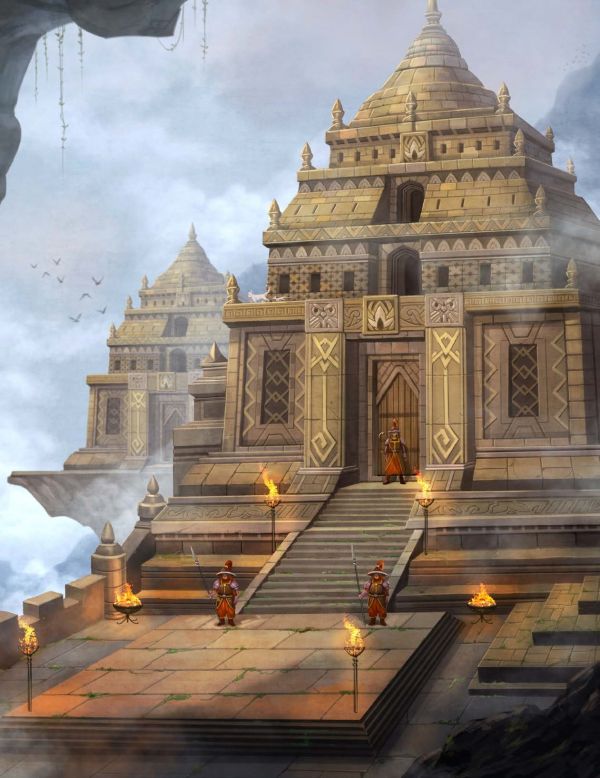
- The second of the great Dwarven Sky Citadels, Dongun Hold sat empty for thousands of years, its people driven underground by the constant barrage of devastation from distant archmages. Now returned to the surface, it faces an era of uncertain prosperity.
In contrast to their future-chasing Alkenstar allies, the mixed Grondaksen and Holtaksen dwarves of Dongun Hold constantly grapple between their treasured, storied pasts and the tense, sober realities of the present. The second Sky Citadel ever created, Dongun Hold is an obdurate monument of defensive engineering, civic planning, and historical significance; its inhabitants are heirs to the legacy of the Quest for Sky and survivors of the Impossible Lands’ age-old disastrous conflicts. Early settlers built the Hold when they reached the surface, a symbol of their victorious journey, and were received as respected allies of Ancient Osirion. The later wars of Geb and Nex devastated and eroded Donguni domains, impelling them to abandon the Sky Citadel for the relative safety of the Vermarine Vaults within the Darklands. This mark of shame was expunged only within the present lifetime when Donguni enlisted the aid of newfound Alkenstar allies to retake and restore the Hold.
Amidst all this tumult, Donguni endured unceasing privations due to famine and plague, and they clung to their identities as martial craftspeople par excellence. They take inordinate pride in their unbending resolve and devotion to dwarven tradition. This self-worth is undoubtedly important for the city, which faces enemies worse than the undead and mutants who stalk their borders and ravage their homes; many fear invading monsters from the Wastes less than the malaises of creeping gloom and simmering kinstrife inside their hearts. While the Hold stands united behind their High King in front of outsiders, the intrigues of three powerful factions—the radically conservative Keepers of the Skyflame, the aggressively ambitious Goldhand Lodge, and the munitions-obsessed Sparkforge Collective—constantly threaten to tear the city apart from within.
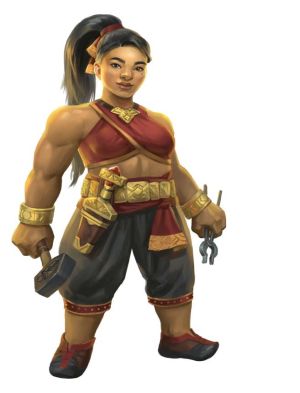
From their mighty Sky Citadel, Donguni stand guard once again over the Mana Wastes, confronted every single day by the howling spell-wracked ruins of a land they once cherished and swore to protect yet also one they ultimately proved powerless to defend from the machinations of mortal mages. Even within the Hold, the triumphalism of the architecture and material culture created during the founding of the Sky Citadel in the wake of the Quest for Sky jars with the present’s experiences and memories of inertia and anxiety. These circumstances and inconsistencies breed shame, despair, self-loathing, desire for rejuvenation, and desperation for revenge. Violent passions surge within Donguni hearts, their stoic rectitude belying the storm which engulfs their collective psyche.
Thus, ensconced in stone and steel, bearing black powder and battle axe, the warriors of Dongun Hold swear to never permit a revisit of such humiliation and helplessness. Vanguards patrol the Mana Wastes, slaying monsters with cannon and incendiary. Essayists and moralists encourage strict returns to imagined pasts, proclaiming the wisdom of the old ways to any who would listen and blaming current problems on ancient misdeeds, as if repeating assertions of bygone grandeur and sins would expunge and explain the chagrin of desertion and defeat.
Despite the spilling of so much blood and ink, past traumas yet remain. As embers of the old Nex-Geb war begin to flicker once more, old scars are reopened. Many older Donguni have started debating the merits of abandoning the Sky Citadel for the Darklands’ embrace. Younger dwarves, born into an era of the alliance with Alkenstar, stridently reject these sentiments, extolling the virtue of working together with their fellow citizens—a stance which further alienates the cautious, insular elder Donguni. Arguments ring through the halls with mercantilists preaching possibilities of wartime profit, traditionalists clamoring to avenge blood feuds, reformists appealing for increased regional collaboration, and outcasts bitterly resenting their downtrodden status. Perhaps these tensions will force evolution and elevation of the Sky Citadel to new heights—or bring it tumbling down in another spell-blasted dance of ruin.
DONGUN HOLD SETTLEMENT 14
LN;TOWN
Government monarchy
Population 4,164 (95% dwarves, 3% humans, 2% other)
Languages Dwarven, Kelish, Osiriani
Religions Abadar, Angradd, Brigh, Torag
Threats Darklands monsters, dwarven politics, mine collapses, saboteurs, wasteland raiders
Besieged By Mage Wars Caught between Geb and Nex, the dwarves of Dongun Hold hold a particular suspicion for undead, fleshwarps, and other creatures often employed in the war that ravaged their home in ancient times. NPCs begin with an attitude one step worse than usual toward such characters and toward characters openly affiliated with Geb or Nex.
Source of Guns Firearms and cannons, though uncommon in most of the world, are available in Dongun Hold. Such items of up to level 18 can be purchased or commissioned from the many dwarven crafters.
Anong Arunak (LG female dwarf aristocrat 16) high king of Dongun Hold[1]
A DAY IN DONGUN HOLD
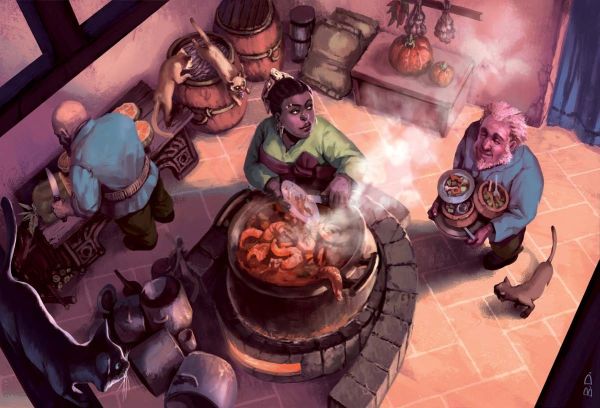
In a curious parallel to their Alkenstar neighbors, Dongun Hold’s communities adopt the use of different standards of time: Forge-days and Coin-days. Stretching 32 hours, forge-days are named and optimized for the cycles of warming and cooling the Hold’s many work-fires, from its industrial forges and kilns to its communal cooking pots. Use of forge-days in Dongun Hold isn’t limited to craftspeople; in a show of faith and affinity with their distant relatives and cherished traditions, forge-days are the standard days for most Donguni. Coin-days are a more recent adoption which measure the 24-hour duration familiar to surface dwellers and are primarily used for business and negotiations with envoys from Alkenstar and other nations. Use of coin-days is also burgeoning amongst younger Donguni, who perceive coin-days as being more practical for life on the surface, rather than adhering to the traditional use of forge-days. For most of the city, days begin with forge-day’s opening, where everyone measures and prepares the fuel to be fed for the day. The process of building and maintaining work-fires requires careful attention and precise communication. Miss an instance of feeding the flames, and some projects might be ruined or delayed from the lowered heat of the forge. Adding too much fuel might cause brittleness and ruin the exact tempering of the arms and armor. Many forge-masters task their younger artisans and apprentices to take charge of these matters; the conscientiousness and attention to detail required form suitable foundations for developing greater technical expertise.
Throughout each forge-day, a comfortable rhythm emerges and intensifies, a cycle of crafting and cleaning as well as repairing and discarding. Hours pass in sweat-drenched labor and brow-furrowing concentration to refine and complete projects. In appreciation and allowance for artisans’ uninterrupted focus and artistic inspiration, forge-masters hold work meetings at the end of the forge-day, in which workers gather to discuss what they’ve learned and made for that day and share their insights and observations to help improve each other’s craft. Afterward, workers head home to rest and spend time with their loved ones.
This process is mirrored in the mines and excavations of the Darklands and Shattered Range; across all Donguni-heavy industries, time revolves around workers’ perspectives and concerns. Policy in these industries is thus set as much by each worker as by overseers’ dictates or market demands, effected by a rare concordance between the rivals of the Sparkforge Collective and the Keepers of the Skyflame. Dissatisfied with what they perceive as the inefficiencies of this traditional approach, the mercantilists and executives of the powerful Goldhand Lodge are trying to change policy by enforcing meetings earlier in the forge-day, where they can give more directions to and get more updates from workers as well as gain more control over their labors and processes. Their attempts have met with limited success, as High King Arunak, in respect of the craft traditions, continues to issue her edicts at the forge-day’s end.
In the interest of helping workers save time and resources, many Donguni work-chefs gather and clean the leavings and scraps from previous meals, then reboil them in massive cauldrons of forge stew, recycling leftover suppers into hearty breakfasts. Whenever individual workers wish to have their meals, they can spoon out bowls of stew and add their own condiments to eat at their convenience. The largest kitchens keep these cauldrons heated for centuries at a go; some of the most famous breakfast kitchens in the city are rumored to boast stews cooking from before the Nex-Geb wars. Donguni war cries frequently refer to this lineage, dismissing the archmages Nex and Geb as less storied and substantial than the city’s beloved vintage stews. Some even enjoy forge stews so much they eat them out of preference, rather than necessity. Connoisseurs claim the stew stock becomes more delightful as more ingredients are added, transforming simple staples of tubers, off-cuts, and preserved meats into wondrous broths with satisfying body and unmatched flavors.
For Donguni who regularly deal with envoys from other nations, such as commodities traders, arms dealers, and ore brokerage firms, coin-days begin by preparing to receive these visitors and traders. Due to the hours of overlap between forge-days and coin-days, the dwarves complete many of their preparations before sunrise, creating an impression of a city that’s always ready for business. To accentuate this image, Donguni businesspeople, diplomats, soldiers, and mercenaries take care to make visitors feel safe and welcome within the Sky Citadel by presenting a friendly and professional image, especially toward their comrades from Alkenstar.
This practiced congeniality runs a little thin when dealing with emissaries from Geb and Nex, who sometimes find themselves receiving more extensive checks, curfews, and security escorts than visitors from other nations—all for their own safety, of course. In any case, despite the city’s attempt to embrace visitors, Gebbites or Nexians rarely stay for long. The magic-dead zone of Dongun Hold proves disconcerting to these spellcasting visitors, and few wish to tarry longer than necessary within this reminder of their nations’ war crimes.
Due to differences between forge-day and coin-day, few visitors to Dongun Hold ever behold the edicts or presence of the High King Anong Arunak, lending her a greater mystique. The High King holds court and issues proclamation when the work of the forge-day ends; in coin-day terms, those times are often during the wee hours of the morning when few visitors are awake or out and about. This pleases those vigilant Donguni who remember the harrowing wars of the past and remain suspicious of outlanders, as this extra veil of secrecy makes them feel a little more protected and insulated from the intrusions of the outside world.
Clan Pistols
Most dwarven clans give clan daggers to their members, a blade specially crafted for a dwarven child before their birth and traditionally used to cut the infant’s umbilical cord. Some dwarves in Dongun Hold have transitioned to forging a special “clan pistol” instead, commissioning or crafting a firearm for their children. Despite a few snide jokes from more traditional dwarves, this gun isn’t used in any capacity during the birth of the intended child; instead, a specially prepared gunpowder blank is prepared and fired from the pistol to announce the child’s birth to the clan.[1]
A YEAR IN DONGUN HOLD
Donguni herald every new year with a cold and somber season of reflection. As winter wheels into spring, tradition dictates no fires can be lit in Dongun Hold. The households’ meals are prepared and eaten without the application of heat, and production halts as the city’s smiths and forges go dark and silent. This period tests one’s preparations and contingencies, when dwarves make do with the resources they’ve stowed away. Clans and guilds cease most of their business, and socializing is conducted only with one’s closest family and neighbors. In every Donguni home, younger family members work together to sharpen weapons and polish armor plates with the help and encouragement of their seniors. Every evening, as the whole city dines simply on sticky glutinous rice or hard cassava bread with accompaniments of smoked meats and salted vegetables, the eldest Donguni recite and sing stories of their ancestors’ experiences of wartime sorrow, which remind the community of what the Geb-Nex war took from their people. As these grayhairs’ voices blend into a patchwork threnody of loss and pain that enfolds the city, the High King joins their songs from a palatial balcony, the famous rich baritones of the Arunak dynasty wafting across the Hold and lending an ephemeral dignity to the Donguni elders’ laments.
As spring comes into full bloom, the melancholic months give way to a burst of color and sound as the High King’s squadrons ceremoniously fire the royal muskets and cannons in a cacophonous salute to new beginnings. Fire lances and rockets launch streaming fireworks, and nowhere in the city is exempt from the fouling dregs of black powder. Cooking fires joyously roar back to life to prepare communal feasts for clan and guild; families and friends finally meet the people they’ve missed over the last season. The foundries and kilns bellow and wheeze with the resumption of production. The first things created each year are clan pistols and clan daggers for the year’s newborns; every workshop is filled with the smiling faces of Donguni parents and their kinfolk preparing to cast and forge the weapons that the newest generation will inherit. The city’s major factions compete to create ever more elaborate and impressive floats of clockwork and wood, which represent the many monsters of the Mana Wastes, Nex, and Geb. These misshapen, mobile sculptures lumber through the city’s streets, inciting cries of fear and wonder from dwarven children, and await mock battles with dwarven adolescents, who rush enthusiastically to face these monsters with the weapons and armor they’ve been working on. This period is filled with energy and hope, an exuberant counterpart to the last season and a time which expresses the Donguni validation of their preparations and vigilance that permit them to safely celebrate the future. When these jubilations conclude, every Donguni works together to clean the wreckage and litter across the city.
For the rest of the year, many Donguni merchants, mercenaries, and militia bid farewell to their clans and guilds as they undertake excursions, assignments, and patrols to procure wealth, safety, and repute for the Hold. Circumstances permitting, lovers typically exchange gifts of small hunting cats when they bid their farewells. The felines are hardy and self-sufficient killers of pests, making them ideal companions on the road. The true sentiment behind such a gift, though, pertains to the notorious independence of these cats, whose haughtiness might make it difficult to show them affection. In this way, the cats are emotional proxies for far-flung lovers—as remote and onerous as it might be to love and care for these aloof cats, it’s still harder to keep one’s passion for a distant lover. When lovers reunite after their journeys, they take care of their cats together if they wish to continue their relationship. If their romance and commitment has faded, they return the gifted cats to each other.
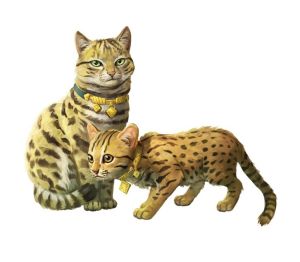
During this open period, most visitors come to Dongun Hold with the hopes of purchasing innovative black powder weapons not available elsewhere in the world, but many will go away empty-handed and disappointed. Despite the Sparkforge Collective’s tireless work to invent and produce ever stronger firearms and the Goldhand Lodge’s irrepressible marketing and hawking of these wares, the High King placed a strict quota on the sales of these weapons in an attempt to both enforce a protectionist price hiking control and to maintain the city’s technological superiority. The staid Keepers of the Skyflame would prefer foregoing the use of guns entirely but find such a quota barely tolerable. Meanwhile, the Goldhand Lodge and Sparkforge Collective preach for economic liberalization and technological openness, arguing the world outside Dongun Hold can soon create similar or better weapons, and if the Sky Citadel doesn’t prepare its markets and workshops for these changes, they might lose this niche. High King Anong Arunak has compromised by loosening (yet retaining) the quota of exports, a move which simultaneously pleases yet annoys every faction in her court.
Other merchants meet with more success, especially those seeking to purchase magnetite, quartz, and gold from the bountiful veins under the Shattered Range. Raw commodities make up the bulk of the Sky Citadel’s trade and bring substantial wealth to Donguni coffers. High King Anong Arunak uses these funds to fortify and repair public works while also providing employment opportunities to her fractious courtiers and their cohorts; with this foreign income, Donguni weapons and defenses are maintained in excellent condition year-round. As the year winds down, and visitors and envoys depart for their homes, the city becomes silent and dark once more, and the steady cycle of Donguni ritual and industry begins anew. [1]
PEOPLE OF DONGUN HOLD
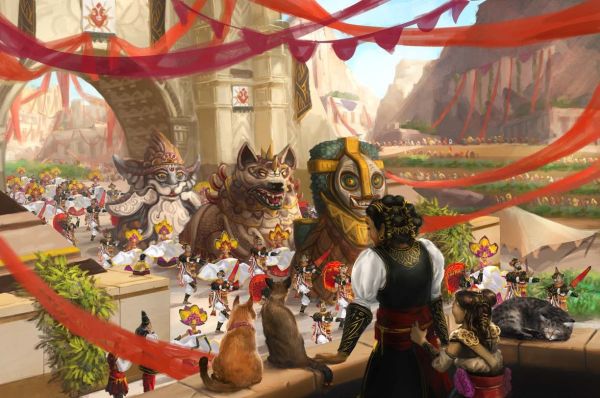
Most outside Dongun Hold associate its people with the same formidable resolve, polite professionalism, and uncomplaining attitudes displayed by Donguni mercenaries and vanguards on the surface. While these associations reflect how Donguni idealize themselves and want others to see them as, Donguni society is far more diverse in their perspectives and practices than many might realize. While composure and stoicism remain widespread in many Donguni—traits developed to cope with the challenges of their long exile, remote seclusion, and wartime loss—these characteristics don’t form the end-all and be-all of the war-prepared, watchful Donguni. The present Donguni favor a rugged lifestyle that blends pre-Earthfall dwarven traditions with influences from other societies that made significant impressions during their explorations of the surface world. Dwarven runic calligraphy from before the Quest for Sky stands alongside hieroglyphic metaphors derived from peaceful Donguni interactions with Ancient Osirians. These symbols are hammered together into a sturdy, somewhat martial bricolage that endured the Donguni’s many centuries of surviving in the Darklands, aloof from other communities and even from their gods (due to their environment’s magic-nullifying qualities).
Nearly everything in Donguni society is both eminently practical and aesthetically significant, with applications for war and peace ranging from heraldry-emblazoned armor detailing the glory of one’s ancestors to flame-resistant creams that protect one’s hair, beard, and skin while working long hours at the forge.
Using scholarly investigations to painstakingly piece together archaeological theories and historical records of their ancestors’ lives, Dongun Hold faithfully preserves and reimagines traditions of dwarven society from before and during the Quest for Sky. The conservators of the Keepers of the Skyflame lead Donguni research into the past and encourage the emulation and adaptation of these traditions for the general public. Some traditions still practiced by Donguni often surprise dwarven visitors from other Sky Citadels, whose homelands might have gone through more cultural developments in tandem with their knowledge and contact of the outside world. Meanwhile, for Donguni, the last few thousand years of isolation have left them determined to hold on to signifiers of cultural identity and historical continuity. This fierce commitment to dwarven ways has attracted the attention of the wider dwarven scholarly community, who consider Dongun Hold a treasure trove of traditional knowledge, customs, and rituals which might have been lost after the Quest for Sky.
Flourishes of Osirian and Kulenett influence permeate Donguni architecture and customs; some outsiders might find these incongruous, given the Donguni reverence for the past. When pressed about these differences, most Donguni simply shrug, seemingly not considering these cultural elements to be alien. Due to the historical length of their ancestors’ fraternization and honored friendships with the Osirian pharaohs, as well as the close ties they shared with the Kulenett dwarves, Donguni have thoroughly internalized some cultural elements from these peoples, hinting at a bygone era of Donguni cosmopolitan openness and artistic experimentation.
One of the most obvious signs of Osirian influence is the prevalence of cats in Dongun Hold. After a series of successful visits by the Osirian diplomat and cat enthusiast, Sa-Aber, the dwarf city fell in love with cats—a love that persisted even with the Donguni retreat into the Darklands. Today, the Hold contains many house cats and strays of different breeds and sizes, lounging near forges and workshops to enjoy warmth and company or hunting venomous snakes and pestilential rats in the alleys and granaries. While dourer Donguni might claim the practical functions of cats as pest control, it seems to bring even the sternest dwarves joy to design and build cat-appropriate rest platforms and playgrounds. Older Donguni congregate around these facilities and bond with each other as they fawn over the felines. These little gatherings provide solace to many lonelier dwarven elders who miss their children working outside the Hold as merchants and mercenaries.
The city’s ornate aqueducts and sophisticated qanats are also cultural borrowings from their association with the Osirians, who created many riverine settlements based on irrigation and alluvial management. The Donguni tunnels connect the Ustradi River’s waters through meandering passages where priests and engineers use the mysterious vermarine of their Darklands vaults to create sifters. These sifters purify the river’s mana-tainted flows, providing the city with sufficient water for its industries, households, and underground reservoirs of emergency water supplies.
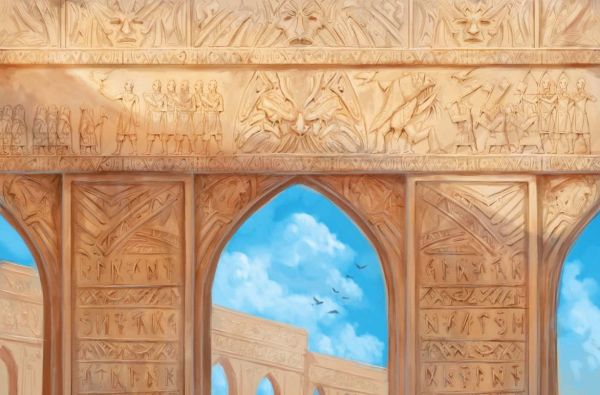
Kulenett influence in the Hold is subtler but no less substantial. As a show of dwarven solidarity and community, even before Donguni retreated into the Darklands, they’d adopted Kulenett local time as a standard for their own calendars. Despite their Holtaksen heritage, many Donguni adopt the Grondaksen way of telling time, which measures forge-days of 32 hours, rather than the surface world’s way of dividing days into 24 hours. Ostensibly, this custom encourages Donguni to think of their Kulenett kin. Even in the absence of physical contact or close communication, by measuring their days and years in tempo with each other, Donguni strive to maintain a living link to their distant relations.
Another sign of Kulenett influence is Dongun Hold’s fastidious standard of cleanliness and public hygiene. Their Kulenett kin, residing in the caverns beneath undead-ruled Geb, developed elaborate rituals and procedures of purification of waste materials—for the Kulenett, any widespread increase in disease or infection is a vector for the spread of necromantic magic, and thus a possible security vulnerability for their Gebbite overlords to exploit. These hygiene protocols also aid in the Kulenett’s positive energy–imbued wards, which spurn the undead. While such a function is of little value within magic-dead Dongun Hold, these protocols provide a morale boost and comforting sense of regularity for the Sky Citadel’s inhabitants. This widespread cleanliness also has practical effects on Donguni life; for a people confronted by the Mana Wastes’ otherworldly contagions, the polluting runoff of their own industries, and the toxin-laden effluvia of Alkenstar factories, these habits are invaluable in maintaining and improving public health.
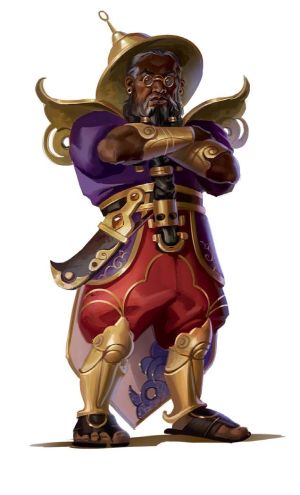
These examples of integration with foreign influences demonstrate how Donguni, through generations of trial and error—as well as the bonds of affection and respect—hybridize their core culture with syncretic elements from others and, over time, make them their own. Careful and pragmatic consideration thus drive Donguni attitudes toward the outside world, alongside no small amount of sentimentalism. The cultural changes which occur most effortlessly not only offer simple utilitarian value, but also possess some degree of resonance with Donguni memories and experiences. This hybridization might be a slow process, but it’s a comfortable and stable one that brooks little complaint from its citizens, save for the most stridently conservative Keepers of the Skyflame.
Recent wider changes—the union with Alkenstar, trade agreements with their former oppressors of Nex and Geb, and more frequent exchanges with other dwarf nations—brought an even greater influx of new ideas, situations, and experiences to spur reflection and transformation of Donguni identities and perspectives. Various segments of Donguni society adapt to these widespread changes quite differently. Older Donguni, familiar with the stories of Gebbite and Nexian atrocity, find it hard to shed the garrison mentality built upon by generation after generation of caution and watchfulness, especially when this mindset had allowed their community to survive unimaginably harsh times. Donguni youths disdain their elders’ worries, perhaps a little too readily, as they claim the challenges of today differ from the past and embrace the learning of new languages, cultures, and technologies with great aplomb. Ethnic diasporas of Alkenstar humans, as well as trade enclaves of Nexian and Gebbite merchants, now form on Donguni peripheries. For the first time in thousands of years, Dongun Hold has again become formally part of an international community, a prospect which proves as anathematic and terrifying to some as it is reaffirming and invigorating for others.
While this inter-generational conflict worries the Hold’s leaders, they also recognize that the world outside has changed drastically from their existing records. Donguni diplomats and commanders despair at the paucity of their outdated archives and maps, relying greatly on the assistance proffered by the intrepid explorer-merchants of the Goldhand Lodge and the city’s Alkenstar compatriots to fill the gaps in their knowledge and calculations. Dongun Hold’s leaders also court teachers and experts from the outside world to share their skills and knowledge with Donguni scholars and craftspersons to equalize the knowledge gap on a more lasting, fundamental level. While these exchanges have proven lucrative and beneficial for the city’s defense efforts, as exports of Donguni minerals and ores mined from the rich veins of the Shattered Range and the Darklands pay for the construction of more fortifications and armaments to protect the city, more cautious and established Donguni disdain foreign goods and markets and encourage an isolationist stance to reject what they see as corrosive influences.
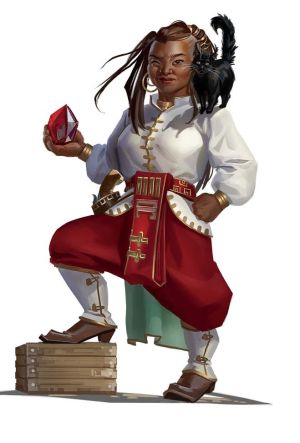
These attitudes might be due in part to their chagrin at the upward social mobility experienced by the gangue—clanless, disgraced, or otherwise outcast dwarves, so named for the commercially worthless parts of ore—with the opening of markets and borders. By public reckoning, gangue are the descendants of dwarves who shamed themselves with dishonorable conduct, particularly during the Quest for Sky and the retreat from the surface. Just as many of Dongun Hold’s moneyed nobles predicate the moral right of their wealth and privilege upon great deeds of imagined ancestors, so does the poverty and destitution of Dongun Hold’s lowborn rest upon the supposed cowardice and wretchedness of their forerunners. Central to Donguni social philosophy is the concept of the skystain, a feeling of shame that envelops the whole society for being descendants of the dwarves who abandoned Taargick’s first outpost to the surface world. The momentous trauma of this event, which affected all these dwarves equally, led to the idea of the skystain as a means to distinguish and explain valor from timidity, glory from obloquy, and the righteous from the villainous. The gangue are scapegoated as most responsible for the skystain, for their ancestors’ failure to act in pro-social ways led to the necessity of withdrawal from Dongun Hold; while everyone retreated, this failure is the fault of only the gangue, whose inadequacies necessitated the retreat.
The much-vaunted stability of Dongun Hold, in many ways, rests upon the traditional ill treatment of the gangue by the wealthy and powerful. For countless years, this division of ‘normal’ society and gangue buttressed Donguni ways. Until recently, gangue were press-ganged into corvee labor to build palaces and public works or sent to serve on missions with little to no chance of survival. Their children inherited their gangue status, perpetuating a systemic continuation of this stigma and its affordances for Donguni society. In fact, until recently, gangue weren’t even recorded within the city’s population census or register of citizens. Gangue are almost non-persons, treated as barely better than the hated duergar. Many of the brightest and most capable gangue find employment within the more egalitarian Goldhand Lodge’s trade caravans or Sparkforge Collective’s gunsmith colleges; even so, they often face discrimination unless they hide, denounce, or reject their gangue origins and identities, thus maintaining the status quo that denies opportunities to the gangue.
With Dongun Hold’s absorption into Alkenstar, new prospects arose for many gangue, who eagerly embrace lives where they don’t have to hold their heads down in shame or obeisance. Gangue make up the dwarven sharpshooters and demolitionists who support Alkenstar patrols, and they’re toasted as dwarves of honor by the grateful surface dwellers. They make up the dwarven alchemists and inventors who enrich the Brass Guild and Lithos Clan with their cutting-edge research. Some even become adventurers seeking lost legacies in the Mana Wastes, hoping to make peace with their names. While attitudes in the practicality-minded Goldhand Lodge and Sparkforge Collective have shifted to grudgingly acknowledge gangue identities (though these two groups still pay gangue less and work them harder than other members), the Keepers of the Skyflame often engage in creating trumped-up charges to justify their seizure of gangue property and wealth. More conniving Keepers play a longer game, targeting dispossessed and frustrated gangue for indoctrination and offering them chances to “reclaim” their honor.
Black Powder Contraband
Unlicensed firearms don’t officially exist in Alkenstar and Dongun Hold, but that’s hard to enforce in a city full of pragmatic inventors and opportunistic merchants. Criminals, the poor, and others without access to licensed firearms often reverse-engineer and improvise with street-scrap to craft innovative firearms, including the unusual triggerbrand, for brawling in Alkenstar’s muck-stained alleys. Political opponents likewise accuse Goldhand Lodge members of smuggling and selling unauthorized firearms, though such misconduct likely occurs far less often than suggested.
Critical Training
No matter how far a Donguni dwarf expects to be removed from black powder and firearms in their daily life, everyone receives basic training in how these items work. Even the lowest of Donguni society, the gangue, are given this education since an explosive accident doesn’t limit its harm to the person who caused it. As a result, many gangue have the skills to easily transfer to Alkenstar’s watch, where they’re viewed more favorably.[1]
CULTURE
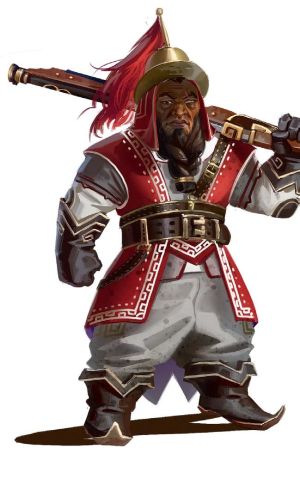
Art and expression play a central role in Donguni life. Pursuits of artistic creation and appreciation made the long millennia of isolation and exile more endurable. Even before their flight from the surface, Dongun Hold enjoyed a reputation among their kin for both their aesthetic sensitivity in observing the beauty of natural phenomena and their practical wisdom for working with the materials found in the natural world. These dwarves remember the lands which constitute today’s Mana Wastes as the Alabaster Lands, both for the region’s widespread availability of the snow-white stone as well as the smoothness of working with the land’s materials. Ancient Donguni crafted and traded ceramics and statues with their Osirian allies; Donguni handicrafts were so highly prized they often became grave goods for Osirian nobles. Donguni painters, used to life both above and below the ground, observed how their darkvision perceived the lights and shadows differently in their dual environments, and they drew inspiration from their experiences to create strikingly lifelike chiaroscuro paintings.
The war of wizards heralded the dissolution of those halcyon days; alone in their remote fastness, Donguni artists transformed in their perspectives and inspirations. Formerly, Donguni art celebrated the subtle joys of peace after the arduous Quest for Sky. As Donguni society in the Darklands looked inward, styles shifted to emphasize the societal solipsistic turn. Portraiture and sculpture conveyed a widespread, almost decadent lethargy and stillness. While material traditions embraced themes of lassitude and stagnation, the performing arts conversely became livelier, with dramatists creating comedies and tragedies drawn from long-gone glory days and musicians inventing new instruments to take advantage of underground acoustics. In recent years, the Donguni alliance and absorption into Alkenstar have provided invigorating new impulses, challenges, and techniques. The most recent fad are Donguni threnody-musicals, where troupes of young dwarves act out and sing stories of their ancestors’ loss and suffering due to the petty wars of wizards. These productions are popular not just in Dongun Hold and Alkenstar, but also among rebellious youths from both Geb and Nex (where these shows are invariably banned, sold out, or both).
The use of prosthetic limbs has become more common in Dongun Hold, a situation rising from the confluence of two factors: the magic-dead city’s absence of divine healing and the widespread presence of clockwork technology brought in by the Alkenstar alliance. Anti-firearm lobbyists, often funded by the reactionary Keepers of the Skyflame, jeer at a third reason: that view that guns are prone to mishaps which harm the wielder and their allies more easily than their enemies. This last position is strongly debated by the Sparkforge Collective’s ironmongers, who design and produce not only most of the city’s guns, but also most of its clockwork prosthetics.
While debates rage on, most Donguni show no sign of ceasing their use of prosthetic limbs; the city’s low population, dangerous enemies, and hazardous environments lead to a widespread pragmatism in appraising injuries. Every wounded soldier or craftsperson embraces means to work for as long as they can because there might simply not be enough people to assume their duties. Many Keepers sneer at this development, warning of Donguni souls being corrupted by clockwork technology, and argue that if Donguni simply turned away from the profane firearms, there would be less need to integrate godless machinery into the perfection of the dwarven form. Some go so far as to insinuate the users of prosthetics possess some moral fault that caused them to deserve their injuries in the first place. The Sparkforge Collective’s artisans simply shrug and refine their craft in reply. The increasing reliability of clockwork technology makes prosthetics more acceptable to many younger Donguni, and there’s even a burgeoning market in bespoke customizations, where fashionable Donguni transform their new limbs into beautiful, yet practical, objects of art.
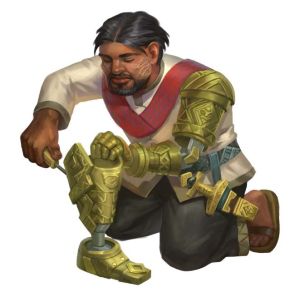
Corruption is a concept of great significance to Donguni perspectives. To a people who witnessed their fellows mutated by magical surges or animated by necromantic plagues and who live in shattered lands of despoiled beauty, the fear of being transformed into something considered inferior or unnatural (such as mutants or undead) creates huge strain on many Donguni. The regressive, reclusive turn in Donguni culture of the last few thousand years also leads to a hankering for nostalgia, where past achievements are idolized and future developments are disdained.
This situation is compounded by the gods’ silence within their magic-dead home. With hope being in such short supply, it’s small wonder why many older Donguni assume things change for the worse and tend to respond with overwhelming force when faced with uncertainty and ambiguity. While individual dwarves experience this inclination toward caution in different ways, a suspicious, often xenophobic slant often marks Donguni attitudes. For example a sharpshooter squadron recently threw Donguni society into an uproar by reporting their encounter with a community of peaceful dwarven mutants in the Mana Wastes. As these mutants followed Donguni traditions and recognized the High King’s authority, they clearly originated from Dongun Hold. These mutant dwarves professed desires to serve the Hold as guides in the Mana Wastes, a vocation they were uniquely suited for given their physiology’s magic-resistant qualities and their knowledge of the Wastes. Many Donguni, upon hearing this news, insisted it was a mutant trick and demanded the pitiless extermination of these pretenders; others protested such a slaughter and advocated equanimity in communication. The resulting compromise led to an unauthorized expedition which destroyed the mutants’ camp, left them alive, and liberated them of Donguni artifacts. While some praised this course as decisive action, a number of Donguni left the Citadel in shamed contrition, hoping to make peace with those who might be their lost and wronged kinfolk.
Due to the food instability of their environment, Donguni cuisine emphasizes rugged resourcefulness and practicality, as well as dazzling use of spices and seasonings, to fashion meals of surprising subtlety and intense flavor. Hunting and foraging supplements farming and animal husbandry, which creates a rich range of ingredients for Donguni chefs and households to work with. Cave boars, snakeheads, and catfish are available perennially in Dongun Hold’s markets, while rare occasions might see princely offerings of chuul belly, cloaker fillets, and mimic ligaments being served up for sale. Tubers such as cassava, yam, and sweet potato are staples year-round, and grains like barley, wheat, and rice are consumed when seasonally available.
Meats are often grilled or cooked in stews or, most commonly, tossed in warm salads, dressed with cilantro, tomatoes, onions, and bird’s eye chilies. Organ meats are consumed as often as tissue flesh; butchers make expert use of all cuts of the carcasses they receive. To further stretch these resources, Donguni cuisine makes use of many preservation techniques, whereby they ferment, pickle, and smoke their foodstuffs. Fermented sausages of pork and blood are particularly popular, as are smoked sweetbreads and dried fish which can be thrown into pots for quick one-dish meals. Alkenstar exports of Gebbite tea have proven popular, giving rise to the trend of consuming fermenting tea leaves among younger Donguni, who chew them as snacks for energy and taste. Older Donguni enjoy sweet-sour cake-like pastes of fermented cassava and other starchy foods, which are often made as by-products of alcohol production. Donguni of all ages enjoy drinking deceptively clear liquors distilled from rice and aniseed, which produce an aromatic fragrance and powerful kick, and during special festivals, they down lagers and ales brewed from heirloom grains and hops cultivated since the Quest for Sky.
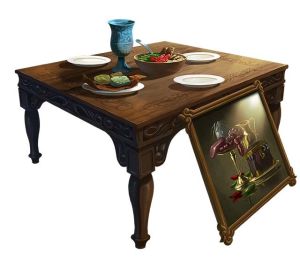
Mother of Medicine
The Rahadoumi healer Kassi Aziril (Legends 70) has caught the eye of many across the Inner Sea due to her major advances in mundane medicine. It’s open news that High King Anong Arunak has sent several letters attempting to court Kassi’s favor and possibly even convince the traveling doctor to visit Dongun Hold and share her methods. This act has invoked the predicted backlash from dwarven traditionalists, many who object strongly to Kassi’s outspoken atheism. Others worry such a meeting will result in yet another massive shift in Donguni society, as it was with Ancil Alkenstar. While concerns of war grow, however, and Donguni ponder if they’ll have to retreat to their magic-less cavern once more, the appeal of healing without the intervention of the gods becomes stronger. It seems possible this political decision is one that even the most staunchly traditional dwarves will allow to pass with only a token protest.
Saltpeter Preservation
Gunpowder rules more than just combat in Donguni life. The Hold’s dwarves used saltpeter, a critical ingredient of black powder, to preserve food when they lived deep in the Darklands and were bereft of magical means of ensuring their meat stayed edible. Though their return to the surface offers fresher fare, the practice is so entrenched that most Donguni insist their food doesn’t taste right without the saltpeter.[1]
GOVERNMENT
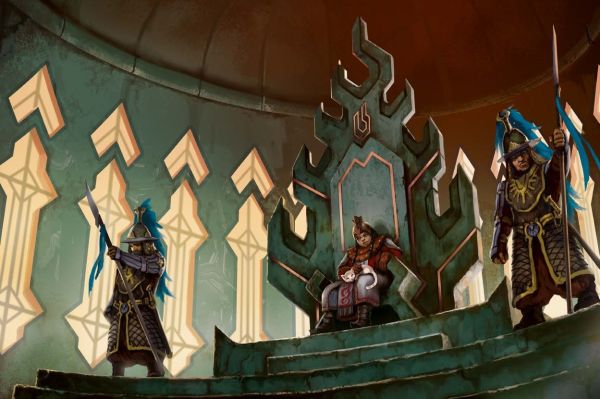
Dongun Hold is nominally a holding of Alkenstar, yet it predates the Clockwork City and literally laid the foundation for Alkenstar’s inception. In recognition of this history, the Grand Duchy makes few attempts to commandeer the Hold and leaves the majority of its affairs and administration to Donguni dwarves.
The Sky Citadel of Dongun Hold was built millennia ago as an outpost for the revered Taargick (Legends 102), First High King of the Dwarves and the King of Sky, to support his vision of a growing network of Sky Citadels across the surface to house, support, and connect emerging dwarven communities. Taargick entrusted this new Sky Citadel’s command and defense to his dependable lieutenant Arnhild Arunak, a doyen of tactical planning and even-handed perspicacity who became Dongun Hold’s first High King.
This position is hereditary; from the perspective of the meticulous craftsmasters who founded the pillars of dwarven society, monarchy allows for the refinement and perfection of enlightened warrior-kings through generations of education and training. To this day, the High Kings of Dongun Hold share Arnhild’s bloodline. Despite its unbroken lineage, this fact is less impressive than it sounds, for the title of High King hasn’t been politically significant for thousands of years. During the long exile into the Darklands, the position of High King gradually lost its notability among the disconsolate Donguni dwarves. While they didn’t totally abandon the institution of monarchy, the High King’s importance in state affairs receded with many Arunak scions becoming feudal figureheads rather than absolutist autocrats.
The offset of this power loss was the flourishing and consolidation of authority and wealth by the Angles of Repose, the advisory councils established during the Sky Citadel’s founding, which traditionally assisted the High King on cultural and commercial matters. The two factions comprising the Angles of Repose are the orthodoxy-minded philosophers and demagogues Keepers of the Skyflame, who zealously serve as the city’s moral guardians and ambassadors to other dwarven communities, and the venturous traders and forgelords of the Goldhand Lodge, whose wits and gumption conjure coins and gems from the barest scree and shale. During their long years of liminal exile in their Darklands vault, doubt and self-loathing gnawed away at the Donguni’s spirits; they were neither able to progress to the surface for fear of its raging wizard-wars nor able to return to the Darklands due to Torag’s edict of the Quest for Sky. The Angles tided many dwarves through these dark times by providing a sense of purpose, be it the Keepers’ constant exhortations to honor and emulate traditional dwarven ideals and aesthetics or the Lodge’s unceasing industries that kept hands and minds busy with creating tools and merchandise. Thus, membership and support for the Angles accreted over time, allowing them to reach their present place of honor and glory. In theory, both groups’ influence is limited to the provision of policy recommendations for the High King’s consideration, thus serving as guides to improve the administration’s long-term stability. In practice, their advice amounts to barely-veiled coercive statements promising dire repercussions for political stability and national security if their concerns and desires aren’t addressed and met.
The present High King Anong Arunak (LG female dwarf aristocrat) has broken with tradition by disregarding their advice with incredible frequency. More impressively, her regime and person have both remained intact, if not increased in stature. Possessed of immense composure and far-sighted sagacity, Arunak has reinvigorated the monarchy. Schooled in sciences, stratagems, and the humanities from a young age, she understood that closed systems, no matter how smoothly they might seem to run, are often unable to survive the challenges of chaotic environments and entropic stasis. Arunak perceived the Angles as having transformed beyond their original purpose of bringing stability to Dongun Hold; they were now bureaucracies accumulating power for the sole purpose of growing and enriching their organizations. Thus, in the interest of long-term survival for her people, Arunak sought to change her society to meet the outside world’s challenges, rather than pursue a path of decay playing at homeostasis. She played both Angles against each other, lulled everyone into a false sense of disdain for her iconoclastic ways, and finally confounded those who thought her a fatuous fool by doing the unthinkable—invoking the ancient, half-forgotten powers of the High King as supreme warmaster. She allied with human refugees and surface exiles who sought to make their homes in the Sky Citadel’s ruins and launched a successful campaign to reclaim Dongun Hold from their monstrous foes. The High King is a title forged in the war fires of the Quest for Sky, and Arunak used this new war to return her people’s pride, regain their ancestral homes, and restore her dynasty’s power from the schemes of courtiers and counsels.
This war also saw the burgeoning prestige of another political faction, the Sparkforge Collective, formerly an oft-overlooked collection of misfit gunsmiths and eccentric weaponeers. Arunak authorized the Collective to share and develop their black powder technology in partnership with the humans; in particular, the efforts and insights of one Ancil Alkenstar proved particularly efficacious to the refinement and rollout of new munitions. While the traditionalist Keepers of the Skyflame railed against this dissemination of dwarven secrets, Arunak classified these weapons manufacturing exercises as industrial collaborations and gave the Goldhand Lodge open rein to administer its trades, taxes, and tariffs, thus using one Angle to counter another while fostering the creation of a third faction friendly to her interests. The Sparkforge Collective is now the unofficial third Angle of Repose, in charge of meliorating the ballistic arts, and have risen to become a prominent guild of gunslingers and inventors celebrated for their guts and artistry.
Today, High King Arunak rules uneasily. Outwardly, she remains an uncontested monarch and war hero as the Redeemer King who returned a Sky Citadel to a lost people; within her court, however, she’s kept in lockstep by smiles and sneers from a people caught between abeyance and ambition. Assassinations (both political and conventional), sabotage, and graft haunt the halls of power, even as resentment against the Hold’s absorption into Alkenstar —and Anong Arunak, who shepherded this transition—fester and grow.
Uncaring Subjects
Alkenstar and Dongun Hold are technically claimed as territories by the nation of Nex. Neither Alkenstar nor the citizens of Dongun Hold pay this political claim any heed, and so far, the Arclords of Nex have been wise enough not to push their luck by forcing the matter. In exchange for this prudent understanding, Nex and Dongun Hold currently conduct a brisk trade with one another, with Dongun Hold sending quartz and other gemstones north for Quantium’s mages.[1]
LOCATIONS
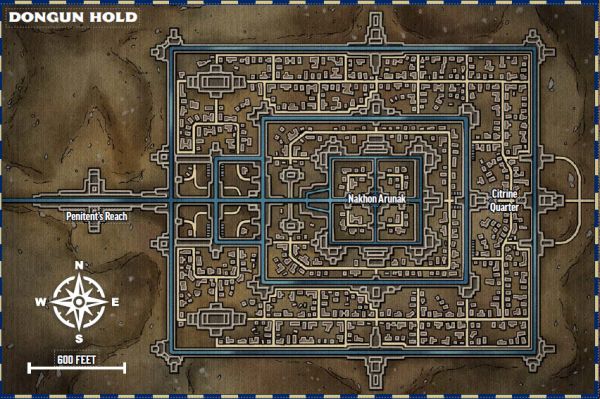
The following are a sample of some of the most prominent locations found in Dongun Hold.
TAARGICK’S PROMISE
Two major passages connect Dongun Hold to Alkenstar City. The most famous is the overland bridge of Taargick’s Promise, which Alkenstari refer to as The Bridge of the Gods. Less prominently, the sprawling subterranean aqueducts of Penitent’s Reach link the Ustradi River with Dongun Hold. While Donguni history coheres with Alkenstar accounts of the Bridge as a nationalist monument commemorating the rebuffing of foreign interventions, Taargick’s Promise holds different resonances for the dwarves. This bridge’s construction began under the watch and care of the earliest Donguni, those who came even before Geb’s and Nex’s existences, in an effort to manifest Taargick’s wish to connect all dwarves. The massive logistics and expenses of such an ambitious structure, however, set construction schedules back. When the Geb-Nex wars arose, the widespread damage caused by unabated war spells halted the project entirely, destroying most of the bridge and leaving behind only broken pylons and sunken foundations. When Donguni reemerged to retake their Sky Citadel, they abandoned Taargick’s Promise, not wishing such close links with Geb or Nex.
When Vijeri Ghazi’s clerical alliance later “discovered” the remnants of the bridge, the priests saw these ornate, durable structures as evidence of divine miracles’ viability in the Mana Wastes—such wonders must be the works of the gods, for who else could’ve built such works in this forbidding land? Surely not the lost tribes and exiles of the Wastes, it must be divine intervention! Breathlessly, the clerics named these edifices a “Bridge of the Gods.” Meanwhile, Toragdan priests in Vijeri Ghazi’s alliance recognized Donguni workmanship, and they were quietly elated to find traces of their long-lost kin. They discreetly sought and contacted Dongun Hold to inform them of Vijeri Ghazi’s plans. The rest is history, as this advance intelligence was a primary reason for Alkenstar readiness to contest Vijeri Ghazi’s aggressions. Now, the bridge simply serves as a trade link for merchants from Nex and Katapesh seeking Donguni quartz and ores for export to distant Vudra, but Donguni patrols take no chances and unfailingly march its lengths.
CITRINE QUARTER
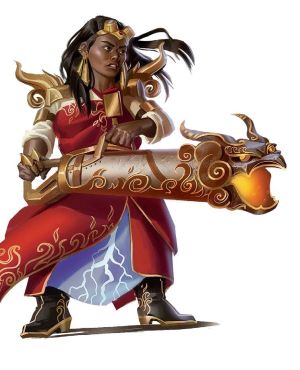
Visitors to Dongun Hold are usually restricted to residence within the Citrine Quarter, the Sky Citadel’s trade district named for the immense quantities of quartz sold within its confines. Under the Goldhand Lodge’s steady guidance, Dongun Hold has become the region’s premier trading hub for business in the Shattered Range’s wealth of minerals and ores; both raw commodities as well as refined goods of the highest quality are available for wholesalers and peddlers alike.
Two distinct levels comprise the Citrine Quarter. The serene surface level of brokerage offices, conference chambers, and travelers’ amenities connects directly to Taargick’s Promise, allowing inbound visitors convenient meetings, swift dealings, and comfortable rests. To the chagrin of many Keepers of the Skyflame, the Goldhand Lodge’s chain of Homesong Hearth traveler’s inns in the Citrine Quarter prove incredibly popular with visitors for their good locations, live entertainment, affordable “traditional” food and drink (of passable quality), and, most importantly, their gaudily colorful decorations that market dwarven culture in a tawdry, almost exploitative manner.
The anarchic underground level, staffed by armies of dwarven craftspeople, logisticians, and managers, is one few visitors deign to visit, and that’s just how the harried Donguni like it. This lower level also houses elegant, well-appointed service apartments for those rare ambassadors and envoys whom Donguni trust and hold in high esteem.
NAKHON ARUNAK
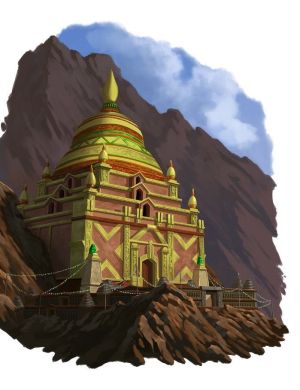
The heart of Dongun Hold is the towering stupa-fortress of Nakhon Arunak, which overlooks the Citrine Quarter and Taargick’s Promise. Carved from marble and quartz, and illuminated in dwarven runes of shining gold leaf, this structure is the ancestral palace of the Arunak dynasty, who has reigned over Dongun Hold since the settlement’s genesis. High King Anong Arunak resides here in the constant company of her predecessor’ relics; every Arunak king’s remains are consecrated in rites sacred to Torag and Angradd and stored within Nakhon Arunak’s golden sepulchral walls, in the belief their presence grants wisdom and gravitas to the current ruler. High King Arunak spends most of her days holding court here, granting audiences and negotiating treaties with spokespersons from the city’s various factions and interest groups. Whatever spare time she has, she spends poring over documents and artifacts from her ancestors’ collections or studying technical proposals from her city’s preeminent scholars. A woman of diamond clarity and adamantine resolve, the Redeemer King Arunak is well-loved for her determination and skill in steering the city to a path of safety, warmth, and fulfillment.
The last decade has seen her rise in good spirits due to the ascension of keen-eyed Grand Duchess Trietta Ricia; Ricia’s spirited wit reminds Arunak of her dearly departed friend, the idiosyncratic, prescient Ancil Alkenstar. Recently, Arunak’s cheer has evaporated, replaced by grim certitude, upon her discovery of controversial documents in libraries unearthed from the unsealed Darklands tunnels. For now, the Redeemer King bides her time and watches her step.
Fortune of Honor
Time, war, and conflict overtook the Mana Wastes and ended the culture of the statue builders that first ceded the territory on which Dongun Hold was built. Yet, being dwarves, the people of Dongun Hold have scrupulously put aside their agreed upon coffer of silver every year for the last 7,000 years, such that now the Nomarch’s Bequest is one of the great fortunes of Garund—though being sensible, the dwarves have also used it as a budgetary reserve in times of crisis, refilling it when the trouble has passed. Should anyone in the modern era convincingly claim to be Pethraseth’s heir, they stand to gain access to a truly vast treasure trove and inherit some equally vast responsibilities.
PENITENT’S REACH
The name of Penitent’s Reach reflects the Donguni reluctance to leave their Sky Citadel. The channels and tunnels of Penitent’s Reach were built in the Donguni’s retreat from the surface to facilitate the flow of water from the Ustradi River into underground reservoirs for use in their Darklands strongholds. The innovative dwarves constructed these qanats from hardy mortar; they are resistant to heat, mold, and moisture damage and are able to store and chill water for long-term use. Consecrated sifters filter the water of dirt and arcane residue while windcatcher towers, fashioned from the broken buttresses of abandoned surface buildings, divert and trap cool air into these passages, providing ventilation, air-conditioning, and refrigeration to the dwarves.
Today, Penitent’s Reach also connects to Alkenstar’s mazy sewer systems. The border zone between Dongun Hold and Alkenstar City is a legal gray area policed and administered by both cities with minimal success. Dwarf squadrons watch the Reach for fugitives and intruders as well as monstrous entities rumored to lurk beneath Alkenstar’s Tinwound Hydroplant, while their shieldmarshal counterparts return the favor from the other side. Somewhere in this no-man’s-land, there’s a nomadic settlement of exiles known only as the Undercity, where the outcasts and mutants of both Donguni and Alkenstar provenance eke out a humble existence as best as they can.
VERMARINE VAULTS
The Vermarine Vaults are the site of the Donguni’s Darklands strongholds, where they retreated from the Geb-Nex wars’ upheavals. When ancient Donguni invoked the dwarven gods’ powerful blessings to ward their withdrawal into the Darklands, the divine magic interacted with the arcane chaos unleashed by Geb and Nex in unexpected, but not unbeneficial, ways. Dwarf prayers mixed with the spell storms, solidifying together into smoky-green vermarine. The mages’ killing words and destructive bursts coalesced from air into stone, their deadly force boiling away into a jade-like quartz. This vermarine coated the Darklands where Donguni sought refuge, seemingly inhibiting magical effects within a wide radius, from the subterranean vaults and tunnels to Dongun Hold and Alkenstar’s Smokeside on the surface. Countless communities and resources were isolated behind the layers of this emerald stone; to this day, Donguni excavator teams continue to unearth new discoveries of kinfolk settlements and lost treasures. As Geb-Nex tensions begin to rise again, the Sparkforge Collective’s researchers experiment with the vermarine deposits, hoping to discover any unusual qualities they can use to protect the Hold, while the wariest, oldest Donguni counsel the High King to order a retreat once more into the Vaults to wait out any coming conflicts.
Succession Troubles
Despite her many political issues and tensions, even the most quarrelsome of Anong Arunak’s subjects admits she’s an exceptionally skilled king. Navigating the return of Dongun Hold to the surface and the massive cultural shift that followed was a legendary feat on its own, and she has maintained order with the many squabbling factions of her Sky Citadel ever since. As a result, the High King’s age has become an increasing worry for many, who recognize a leader of Anong’s quality is rare, and that her death will likely cause a strain that risks cracking the foundations of current dwarven society. Small groups of dwarves can be found gathering from time to time to discuss solutions, ranging from somehow convincing the king to purchase Sun Orchid Elixir, to ensuring a specific candidate for the next king is appointed, to taking drastic measures against Dongun Hold’s most disruptive elements before the king passes on. [1]
IMPORTANT FACES
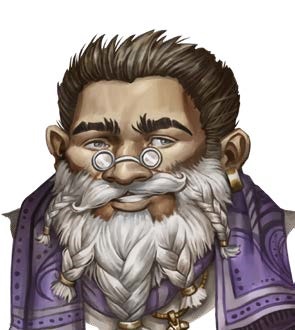
Quietly observant Gravgaic Quartzmane (LG male dwarf healer) is barely into his 40th year but has seen and experienced more than most Donguni. Gravgaic struggles to integrate his foreign knowledge of medical science with his traditional upbringing; he hails from the Quartzmanes, a clan of healer-priests famed during the Geb-Nex wars for their Torag-granted restorative skills. The Quartzmanes’ glory has faded today, as their healing prayers are stymied by the Sky Citadel’s magic-dead environs. Gravgaic, wishing to rehabilitate his clan’s honor, answered High King Arunak’s call for healers to study non-magical healing arts from Kassi Aziril (NG female human alchemist; Legends 70) in distant Rahadoum.
Despite royal scholarships, few wished to visit atheist Rahadoum, notorious for its militant godlessness. Gravgaic is the only Donguni student thus far who accepted, persevered, and graduated from these studies. Taking his university fellows’ disdain of his religious background in stride, he learned what he could from the Mother of Medicine’s revolutionary methods of vaccine production, polytrauma mitigation, and medical research. The pious Gravgaic has recently returned to Dongun Hold, faith tempered from this pilgrimage, and seeks to teach what he knows. Aware of life’s cruel ironies, patient Gravgaic steels himself for his society’s accusations of heresy while he struggles to serve his nation with every ounce of his being.
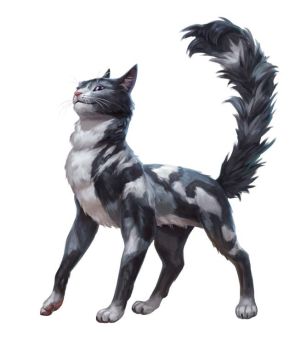
The piebald Chanthou (NG female silvanshee) makes her home in grand Ingot Square, trading hub of the Sky Citadel, though the black-silver cat agathion has also been seen napping on the roofs of Nakhon Arunak, mewing for travelers’ attention and food on the Bridge of the Gods, and staring inquisitively at work teams excavating paths to the collapsed Vermarine Vaults. Chanthou is adored by nearly everyone in Dongun Hold. Despite urban myths of her supposed longevity, nobody suspects the beloved feline as anything more than a pampered and well-groomed alley cat.
Chanthou settled in Dongun Hold before the dwarves’ retreat, serving as Nirvana’s watcher of the dwarves’ tribulations. Her heart was moved by the efforts of a nameless dwarf clan who spent their fortune doing all they could to shelter the city’s animals, even as the city descended into chaotic desolation. Chanthou swore their good work would neither go forgotten nor unrewarded. To this day, the inquisitive celestial protects the city’s animals from cruelty and abuse and brings warnings to the descendants of that kind-hearted clan—who have no idea of her true nature but consider her presence an unmistakable sign of good luck.
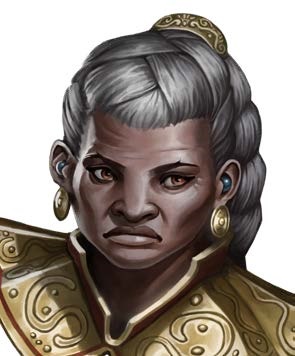
Firekeeper Sovanna Lightpath (LN female dwarf grandmaster) is one of the most respected Keepers of the Skyflame. Staunchly conservative in her adherence to dwarven traditions, Sovanna preserves ancient Donguni martial arts developed during the Geb-Nex wars through practicing and teaching them to fellow Keepers. A famous denouncer of firearms, Sovanna’s martial perfection allows her to pluck gunshots from the air, strike with explosive force that eclipses cannon fire, and carve tunnels in stone with her earth-shattering kicks. The Keepers praise Sovanna’s techniques as an example of how true dwarven power can emerge without the devilry and weakening influence of black powder.
Sovanna’s other techniques, honed to fight the Geb-Nex wars’ eldritch horrors and undying corpses, are also valuable to contemporary Donguni as similar menaces in the Mana Wastes surface anew. Over the past generation, with tensions between Geb and Nex flaring and monstrous foes becoming more common, Sovanna faces aspirant after aspirant seeking training in her traditional arts. By all accounts, Sovanna should be pleased with this resurgence in popularity for her techniques, but the modest grandmaster is instead vexed by how the Keepers portray her as an invincible warrior-saint and her beloved arts as unbeatable techniques. A sense of self-doubt also gnaws at her, for despite her art’s resurging popularity, few of her new students last through the austerities of her training, and fewer still attain any meaningful progress to martial mastery. However, the old dwarf assiduously teaches on, for such is her craft and purpose.
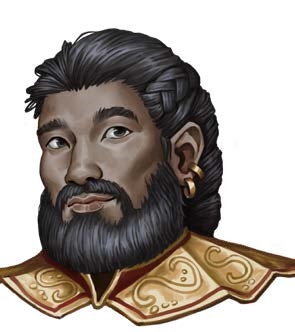
If Sovanna knew what her fellows planned for her students, it would surely break her graying heart. Her superior, Flamespeaker Borey Ironchime (NE male dwarf demagogue), is the city’s most influential Keeper, responsible for the recent promotion of Sovanna’s art. Borey tirelessly recruits new Keepers from the gangue population and accepts them into the junior ranks of the organization. With an easy smile that never quite reaches his eyes, charismatic Borey effortlessly sweeps his lowborn juniors into his confidence, claiming solidarity and sympathy with their hardships as well as esteem for their true value. Meanwhile, Borey poisons their minds to resent those he depicts as their oppressors, which invariably includes the bloodline of the modernizer-king Anong Arunak. Such performative transgressions confer upon Borey the appearance of a daring, ultra-reactionary truth speaker and strengthen the facade of enlightened inclusivity he portrays upon his gangue followers.
The duplicitous Borey has been carefully indoctrinating gangue to become his disposable weapons against the High King and her supporters in the Sparkforge Collective and Alkenstar. In 4690 AR, Borey’s proudest achievement yet was the clandestine sabotage of Alkenstar’s Gunworks, whereby his saboteurs facilitated the successful theft of Alkenstar’s large-bore bombards by the forces of Ruthazek the Gorilla King. Now Borey frequently sends Sovanna-trained gangue Keepers to raid Alkenstar facilities and assassinate dwarf patrols on assignment in Alkenstar. Their anti-firearm techniques prove invaluable for fighting these personnel and capturing their weapons that Borey then releases to the Mana Wastes’ mutant giants. When these mutant giants attack, more dwarven lives are taken by firearms, which Borey hopes will discredit both these weapons and the Donguni-Alkenstar alliance. Despite the Keepers’ historical contribution in oppressing the gangue, Borey’s patsies, denied status and affection, are tragically loyal to the Flamespeaker who lavishes gifts and praise upon them; rather than risk capture, many zealots would rather carry their secrets to their deaths. If Sovanna knew her students were using traditional Donguni techniques to take Donguni lives, the resultant anguish might drive the old master to follow them into the grave.
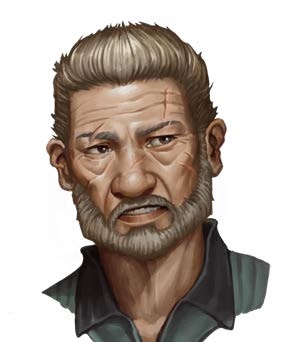
The grizzled Pavis (CG male human renegade) serves as High King Arunak’s special attache in matters too sensitive to entrust to dwarven agents. Some time back, patrols found Pavis in tunnels outside Dongun Hold, half-dead from blood loss; apparently, the luckless (or lucky) human had survived being gunned down and thrown off Alkenstar’s towers and crawled into the city’s sewers to evade his assailants. Stabilized and brought before High King Arunak, he was offered sanctuary in Dongun Hold in return for serving as her special investigator. To sweeten the deal, Arunak also promised to assist Pavis in exacting vengeance upon his would-be murderers.
Pavis is the alias of Armand Meneley, former High Shieldmarshal of Alkenstar, victim of treachery from his former friend, Aredil Sultur. Sultur’s illicit influence on the shieldmarshals had been overlooked by Meneley, whose sentimentality blinded him to the roots of both his associates’ and organization’s misfeasance. When Sultur’s most transgressive schemes were exposed, Sultur slickly shifted blame onto Meneley, scapegoating and then assassinating him and his family through the aid of corrupt shieldmarshals. While Meneley survived, his name and spirit haven’t. Alkenstar remembers him as the shieldmarshals’ greatest shame, and impatience-tinged fury clouds Meneley’s heart. Arunak has reluctantly promised to consider his accounts settled when he completes his latest mission—the covert delivery of a coded missive to Overlord Ardax the White-Hair of Urgir. After this one last job, the betrayed lawman hopes to return to the Clockwork City and set things right in a blaze of glory.[1]
ADVENTURING IN ALKENSTAR
- La technologie rare et innovante d'Alkenstar est, de loin, l'élément qui a le plus d'impact sur la psyché des étrangers. La simple mention de la nation évoque des images de mystérieux vagabonds armés de pistolets explosifs, d'armures incroyablement fines et d'inventions d'horlogerie qui semblent presque magiques. Les personnages d'Alkenstar ont accès aux options peu communes de cette section.
L'ÉQUIPEMENT D'ALKENSTAR
Bien que les armes d'Alkenstar parviennent à capter l'imagination des habitants et des visiteurs, elles sont plus difficiles à obtenir que les romans ne le laissent croire. Les voyageurs et les touristes se rendent souvent sur les marchés pour acheter des souvenirs moins dangereux de leur séjour.
VIN DE GLACE ALKENSTAR ITEM 5+ UNCOMMON ALCHEMICAL CONSUMABLE DRUG INGESTED POISON POSITIVE Prix 25 gp Usage tenu dans une main ; Vrac L
Cette bouteille de vin de glace délicatement sucré a les propriétés de l'alcool (Pathfinder Gamemastery Guide 120). Fabriqué exclusivement à partir de raisins gelés par les tempêtes erratiques des Terres de Mana, le vin de glace d'Alkenstar trouve un marché facile parmi les Geb, bien que les morts-vivants soient toujours immunisés contre les effets énumérés de la drogue.
Le prix indiqué est celui d'un millésime médiocre, mais les millésimes plus fins sont d'un niveau plus élevé et donc plus chers.
DUSTER PLATED ITEM 0 UNCOMMON ARMOR Prix 2 gp En vrac 1
Ces longs manteaux amples en toile ou en cuir sont doublés de plaques de métal, offrant à ceux qui les portent un répit dans les tempêtes de poussière et les taches de smog d'Alkenstar, ainsi qu'une protection modeste contre les balles et les couteaux. Bien que ces vêtements ne puissent pas entièrement empêcher les tirs, leur utilité, leur prix abordable et leur confort leur assurent une grande popularité, en particulier parmi les maréchaux de la ville, qui les ont adoptés comme une sorte d'uniforme officieux. Un plumeau plaqué peut être enfilé avec 2 actions d'Interact ou dans le cadre de l'enfilage d'une armure légère. Lorsqu'il est porté avec une armure légère des groupes tissu, cuir ou chaîne, le plumeau plaqué augmente le bonus d'objet de l'armure à la CA de 1, aggrave la pénalité d'échec de l'armure de 1, réduit le plafond de Dextérité de l'armure de 1, augmente le score de Force requis pour ignorer la pénalité d'échec de l'armure et la pénalité de Vitesse de 2, ajoute le trait bruyant et change le groupe de l'armure en composite. L'armure devient également plus lourde (de légère à moyenne) et vous utilisez le bonus de compétence correspondant à ce type d'armure modifié. Vous ne pouvez pas utiliser un plumeau plaqué avec une jupe blindée (Pathfinder Lost Omens : Character Guide 91) ou tout autre objet qui modifie les statistiques d'une armure.
MONTRE DE POCHE ITEM 2 NON COMMUNE Encombrement L Usage tenu dans une main Prix 25 gp
Cette montre est une merveille d'horlogerie et de miniaturisation. Ses engrenages, son arbre et son ressort principal ont été minutieusement conçus et réglés pour maximiser la précision et réduire les pertes de temps. Cette montre de poche a les propriétés d'un cadran d'horloge (Pathfinder Lost Omens : Pathfinder Society Guide 114), sauf qu'elle a une durée maximale de 24 heures et qu'elle est disponible pour les personnages d'Alkenstar.
COUVERCLE ITEM 3 UNCOMMUN Prix 50 gp Usage tenu dans une main ; En vrac L
L'omniprésence des constructions d'horlogerie à Alkenstar a stimulé le développement de la clé à molette (abréviation de "clé à molette") par des criminels innovateurs ("clés à molette") pour créer des exploits de sécurité et des opportunités de larcins. Vous gagnez un bonus d'objet de +2 aux tests de Désactivation d'un dispositif effectués contre des créatures d'horlogerie (généralement pour les ralentir).
NOUVEAU COMPAGNON ANIMAL
Bien qu'ils soient originaires de l'étendue de Mwangi, les reptiles connus sous le nom de wraiths aquatiques ont migré vers les Terres Impossibles dans le passé. Chassés de l'extinction locale lors de la guerre Nex-Geb, ils sont récemment revenus se tapir dans l'imposante rivière Ustradi. Les équipes de reconnaissance d'Alkenstar qui s'aventurent dans les inhospitalières Terres de Mana apprécient les wraiths d'eau pour leur instinct aiguisé dans la recherche de sources d'eau ainsi que pour leur capacité à changer de couleur et à transmettre clairement des signaux visuels sur de longues distances, un atout tactique précieux pour les efforts de renseignement militaire d'Alkenstar.
Spectre d'Eau
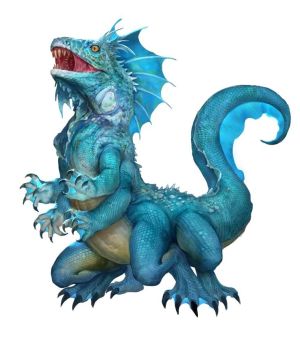
NON COMMUN
Votre compagnon est un spectre d'eau, un lézard amphibie et expressif capable de changer la couleur de ses écailles à sa guise. Bien que votre compagnon n'ait pas encore atteint toute sa force et son intelligence, il vous sert toujours avec une ténacité et une loyauté admirables, sans parler de sa gueule de lamproie aux dents lacérantes et de ses huit pattes griffues et tranchantes.
Taille Petite Compétence Survie Str +3, Dex +2, Con +2, Int -4, Wis +1, Cha +0 HP 6 Vitesse 20 pieds, nage 25 pieds Mêlée [action simple] mâchoires, Dégâts 1d8 perçant Mêlée [action simple] griffe (agile), Dégâts 1d6 tranchant Spécial Le spectre d'eau peut retenir sa respiration pendant environ 2 heures. Soutien Avantage Votre spectre d'eau siffle et se transforme Manœuvre avancée Gouler du sang
GORGE DE SANG [action unique]
Conditions La dernière action du spectre aquatique a été une attaque de mâchoires réussie contre un ennemi.
Le spectre aquatique gagne 2d8 points de vie temporaires qui durent 1 round, et l'ennemi subit 2d6 dégâts de saignement persistants. Si le spectre d'eau a une spécialisation, il gagne 3d8 points de vie temporaires et la cible subit 3d6 dégâts de saignement persistants. Si la créature ciblée n'a absolument aucun fluide vital, cette capacité peut ne pas fonctionner, à la discrétion du MJ.
LA VOIE DE LA GÂCHETTE
Vous préférez les armes à feu qui fonctionnent aussi bien en mêlée qu'à distance, en particulier celles qui vous permettent de faire preuve d'un peu de style et d'élégance. Vous pouvez être un survivant qui a bricolé son arme à partir des rebuts de la ville de Smog ou un noble qui possède une arme de maître forgeron commandée sur mesure pour les duels parmi l'élite d'Alkenstar. En plus des armes combinées présentées aux pages 158-159 de Pathfinder Guns & Gears, vous avez accès à l'arme combinée triggerbrand présentée ci-dessous. Reload du frondeur Touch and Go Deeds Initial Spring the Trap ; Advanced Wind Them Up ; Greater Drive Them Down Way Skill Thievery
TRIGGERBRAND
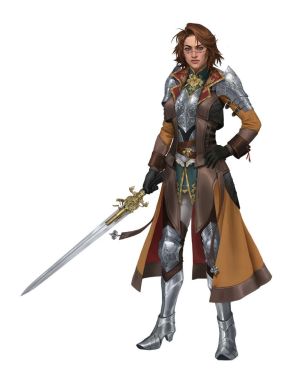
PEU COMMUN ; COMBINAISON
Masse 1 Usage tenu dans une main Prix 10 gp Cette arme combinée inhabituelle intègre les caractéristiques d'un pistolet à silex et d'une épée courte. Comme les autres armes combinées, le porteur peut la transformer entre le mode à distance et le mode de mêlée par une action d'interaction.
Recharge du frondeur
TOUCH AND GO [simple action]
LANCEUR D'ARMES
Conditions requises Vous maniez une arme combinée.
Les ombres de votre corps masquent l'acier de vos mains. Vous pouvez faire un pas vers un ennemi, vous pouvez interagir pour changer votre arme entre le mode mêlée et le mode à distance, puis vous interagissez pour recharger.
Acte initial
LE PISTOLET [action libre]
GUNSLINGER
Déclencheur Vous faites un jet d'initiative.
Vous pouvez interagir pour dégainer une arme combinée et la mettre en mode mêlée ou à distance. Lors de votre premier tour, votre mouvement et vos attaques à distance ne déclenchent pas de réactions qui sont normalement déclenchées par le mouvement ou une attaque à distance (comme l'attaque d'opportunité).
Deed avancé 9ème
WIND THEM UP [deux actions]
ARMEUR
Les ennemis doivent-ils parer votre lame ou esquiver vos balles ? Ni l'un ni l'autre, ils devraient plutôt surveiller leur porte-monnaie. Effectuez un coup en mêlée avec votre arme combinée, puis tentez un test de Vol avec une pénalité de -5 pour voler votre cible ; vous ne pouvez pas voler des objets étroitement gardés ou des objets qui prendraient beaucoup de temps à voler. Vous n'avez pas besoin d'avoir la main libre pour tenter de voler quelque chose de cette manière. Si vous réussissez votre test de Vol, la cible est à plat contre vos attaques à distance jusqu'au début de votre prochain tour, et vous ne déclenchez pas les réactions qui sont normalement déclenchées par le mouvement ou une attaque à distance.
Ces effets se produisent même si la cible n'a pas d'objet à voler.
Greater Deed 15ème
BREAK THEM DOWN [deux actions]
GUNSLINGER
Vos ennemis ne sont que des scories à partir desquelles vous sculptez et tirez votre légende. Effectuez un coup en mêlée puis un coup à distance avec une arme combinée, tous deux contre le même ennemi ; vous n'avez pas besoin de changer de mode pour le faire. Si la frappe en mêlée touche, vous bénéficiez d'un bonus de circonstances de +1 au jet d'attaque de la frappe à distance. Chaque attaque compte pour votre pénalité d'attaque multiple, mais votre pénalité d'attaque multiple n'augmente pas tant que vous n'avez pas effectué les deux attaques. Si les deux frappes touchent, vous infligez 2d6 points de dégâts de saignement persistants supplémentaires à l'ennemi, qui reste ébloui jusqu'à ce que ces dégâts de saignement persistants prennent fin.
PROUESSES DU FLINGUEUR
Les deux exploits de pistolero suivants ne sont disponibles que pour les pistoleros qui suivent la voie de la marque à la gâchette.
TRIGGERBRAND SALVO [une action] FEAT 6
FLORAISON DU PISTOLERO
Prérequis voie de la marque de la gâchette
Conditions Vous maniez une arme combinée.
Vous tranchez, poignardez ou frappez votre adversaire avec la partie de mêlée de votre arme combinée avant d'appuyer sur la gâchette à bout portant. Effectuez une Frappe en mêlée avec votre arme combinée. Si la frappe est réussie, vous pouvez immédiatement effectuer une frappe à distance contre la même cible avec cette arme combinée, et vous bénéficiez d'un bonus de circonstances de +2 au jet d'attaque. Cela compte comme deux attaques pour votre pénalité d'attaque multiple, mais vous n'appliquez la pénalité d'attaque multiple qu'après avoir effectué les deux attaques.
TRIGGERBRAND BLITZ [trois actions] FEAT 14
ARME À FEU
Prérequis voie de la marque de la gâchette
Fréquence : une fois par minute
Exigences Vous maniez une arme combinée.
Vous dansez à travers vos ennemis, poignardant et tirant. Vous marchez, effectuant jusqu'à trois frappes avec votre arme combinée à n'importe quel moment de votre mouvement, chacune contre une cible différente. Vous pouvez effectuer n'importe quelle combinaison d'attaques en mêlée et à distance sans avoir à changer de mode pour le faire, bien que vous ne puissiez généralement pas effectuer plus d'une attaque à distance en raison de la nécessité de recharger. Cela compte comme trois attaques pour votre pénalité d'attaque multiple, mais vous n'appliquez la pénalité d'attaque multiple qu'après avoir effectué les trois attaques. Après avoir utilisé Triggerbrand Blitz, vous êtes fatigué pendant 1 minute.
==MARSHAL DE BOUCLIER
(ARCHETYPE)
Rareté : Peu commun
Les armes à feu ne suffisent pas à faire respecter les lois d'Alkenstar ; lorsque les criminels et les corrompus ont facilement accès aux armes à feu, s'appuyer uniquement sur la puissance de feu n'est pas toujours la meilleure approche pour faire respecter la loi. Pour rester en tête dans leur guerre sans fin contre le crime et l'espionnage, les maréchaux d'élite d'Alkenstar affinent leurs compétences en matière de tir et de connaissance de la situation en un puissant mélange de perspicacité opérationnelle et de tactiques spéciales. Les shieldmarshals étudient la médecine légale, l'ingénierie, le droit et l'étiquette pour s'adapter aux conditions et à la politique instables de la ville. Les cours avancés comprennent une formation spécialisée pour traiter avec les criminels utilisant la technologie ainsi qu'une analyse tactique pour manœuvrer dans les environnements urbains encombrés. Vous avez suivi une formation spécialisée pour vous aider à maintenir la paix dans les rues tentaculaires d'Alkenstar. Les opérations urbaines sont d'une redoutable complexité ; les portes fermées et les hauts murs dissimulent des suspects et des belligérants, tandis que chaque ruelle et chaque couloir peut être un entonnoir fatal. En tant que maréchal des logis, vous surmontez ces difficultés en réduisant les éléments incertains et en vous y adaptant.
Vous observez méthodiquement votre environnement, prenez des décisions rapides et actualisez les meilleures pratiques pour apaiser les hostiles, sauver les otages et atteindre les objectifs globaux de la mission.
Feats de l'archétype Shieldmarshal
PROUESSE DE DÉVOUEMENT DU SHIELDMARSHAL 2
ARCHÉTYPE DÉVOUEMENT
Votre formation de shieldmarshal d'élite vous permet d'être aussi à l'aise dans la misère de Smokeside que dans la splendeur de Skyside.
Vous êtes intimement familier avec les rues labyrinthiques et les statuts de la ville. Vous êtes formé à la Société ; si vous l'étiez déjà, vous devenez expert en Société. En milieu urbain, vous pouvez tenter des tests de Société pour sentir la direction. Vous gagnez également les caractéristiques de Courtly Graces et Streetwise.
PANOPTICON DE COUVERTURE CONSOLIDÉE [une action] FEAT 4
ARCHETYPE
Prérequis Dévouement du Shieldmarshal
Fréquence : une fois par heure
Vous vous êtes porté volontaire pour une procédure expérimentale controversée visant à installer des prothèses oculaires d'horlogerie. Ces yeux transmettent ce que vous voyez au quartier général du maréchal-ferrant, qui consolide et analyse les données environnementales - probabilitésronzetime/surgetime, pression, température, vent, et ainsi de suite - et vous les renvoie. Le maître de fer examine périodiquement les archives d'informations dans le cadre de ses efforts continus pour éradiquer la corruption de la police. Lorsque vous utilisez votre Panopticon consolidé, vous suralimentez les prothèses oculaires ; pendant la minute qui suit, vous bénéficiez d'une vision dans le noir et d'une vision en basse lumière, et vous gagnez un bonus d'état de +1 aux tests de Perception visuelle. Même lorsque les prothèses oculaires ne sont pas surchargées, vous conservez votre vision normale.
DÉFENSE ÉQUITABLE [réaction] FEAT 8
ARCHETYPE
Prérequis Dévouement du Shieldmarshal
Fréquence : 1 fois toutes les 10 minutes
Déclenchement Vous subissez les dégâts d'un coup critique.
En serrant les dents contre la douleur, vous vous positionnez pour contre-attaquer. Vous gagnez une résistance aux dégâts du coup critique égale à la moitié de votre niveau. Tant que vous êtes conscient après l'attaque, vous pouvez Interagir pour recharger une arme que vous portez ou Stand. Vous gagnez un bonus de circonstances de +1 à la prochaine attaque que vous portez contre la créature qui vous a infligé un coup critique, à condition que vous le fassiez avant la fin de votre prochain tour.
FOCUS CONTRE-COUPLE [une action] FEAT 10
ARCHETYPE
Prérequis Dévouement du Shieldmarshal
Fréquence : une fois par round
Vous comprenez que la doctrine des forces de l'ordre doit s'adapter à l'évolution constante de la technologie et des arcanes. Votre formation en armes et tactiques spéciales vous donne accès à des techniques inhabituelles pour répondre aux crimes liés à l'horlogerie et à la magie. Vous appliquez des additifs spéciaux à une arme à feu chargée. Lors de votre prochaine attaque avec cette arme à feu avant la fin de votre tour, vous infligez 2d6 points de dégâts supplémentaires si la cible est une construction, et vous pouvez traiter les munitions comme du fer froid ou de l'adamantine, au choix. Au 18ème niveau, ces dégâts supplémentaires passent à 3d6, et vous pouvez choisir de traiter les munitions comme de l'orichalque.[1]